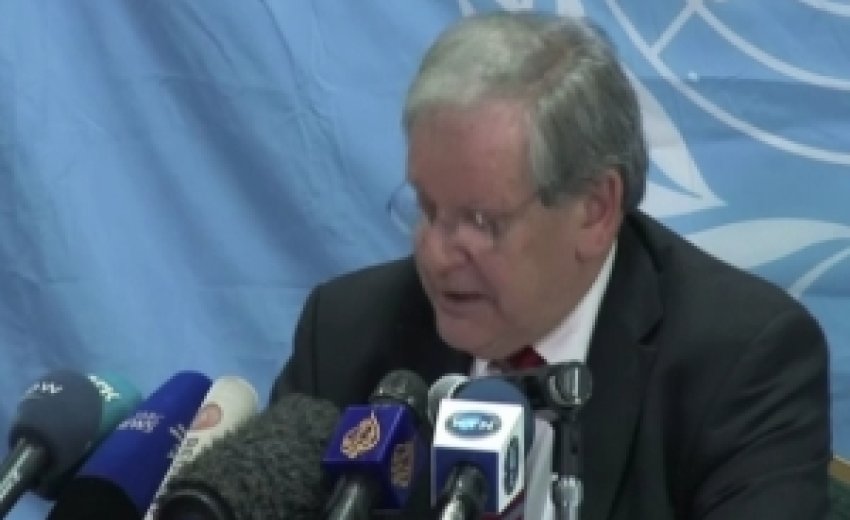UN declares Famine in Somalia
26 July 2011: The BBC's Andrew Harding says getting aid deeper into Somalia "is very slow, very complicated and... very dangerous"
The UN World Food Programme says it is delaying airlifting food to Somalia's capital for administrative reasons.
It was to be the first airlift of food aid since the UN declared a famine in two areas of Somalia last week.
Islamists, who control most of Somalia, have banned the WFP from their areas and thousands of people are fleeing towards the capital in search of food.
Somali Foreign Minister Mohamed Ibrahim has warned more than 3.5 million people "may starve to death" in his country.
Al-Shabab, which has ties to al-Qaeda, has accused the groups it has banned from its territories of being political.
Before the postponement, WFP spokesman David Orr had told the AFP news agency that the flights were waiting only for clearance forms to be completed before taking off.
Somali model Iman warns: "One million children alone are at risk on a daily basis"
When the airlifts begin, the aid will be flown from Kenya to Somalia's capital, Mogadishu, where the weak interim government - backed by an African Union peace force - controls only parts of the city.
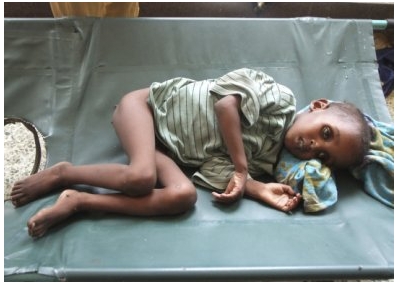
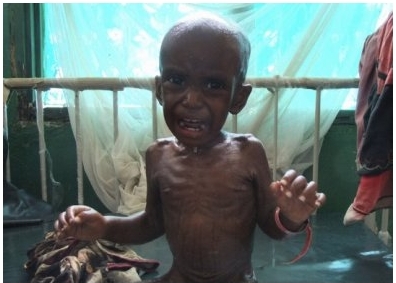
The 14 tonnes of Plumpy'nut, a peanut-based paste high in protein and energy primarily targeted at malnourished children, was flown from France to Kenya on Monday.
Similar flights are also due to take aid into the Ethiopian town of Dolo Ado, from where it can be moved across the border into Jubaland, a sliver of land held by Somalia's pro-government forces just west of famine-hit Bakool.
Samosas banned
Tens of thousands of Somalis have been fleeing al-Shabab areas and heading to Mogadishu and neighbouring Kenya and Ethiopia in search of food.
The UN refugee agency said on Tuesday that some 100,000 people had arrived in Mogadishu and settlements around the city in search of food and water in the past two months.
WFP head Josette Sheeran announced the emergency aid flights on Monday at an East Africa drought crisis meeting in Rome - called by France, which chairs the G20 group of developed and emerging economies.

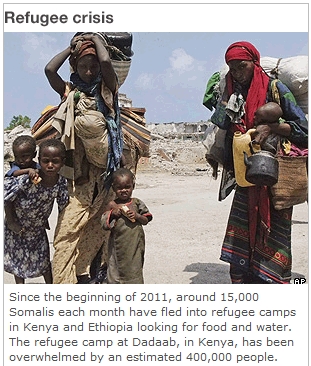
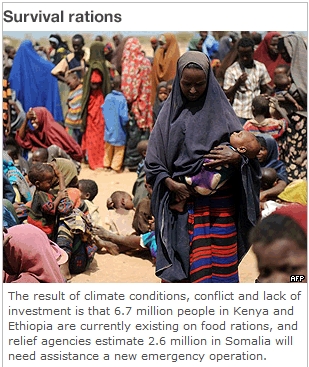
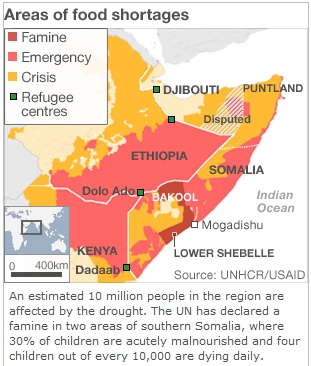
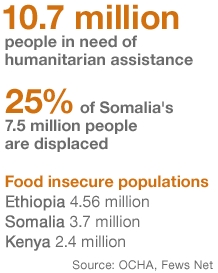
The UN estimates more than 1.5 million Somalis are internally displaced by hunger - most of them in central and southern Somalia, where 75% of the territory is controlled by al-Shabab.
In Rome, Mr Ibrahim highlighted UN estimates that "more than 3.5 million Somalis, the vast majority of them in the insurgent-held areas, may starve to death".
But the director of the international charity Goal, John O'Shea, told the BBC that the UN's response to Somalia's political crisis had worsened the crisis.
He said the UN Security Council should have authorised a sizeable force of peacekeepers to end years of conflict in Somalia.
"We wouldn't have four million Somalis starving if they sent in UN peacekeepers," he told the BBC's Focus on Africa programme.
Somalia has 9,200 African Union peacekeepers out of a promised 20,000 - all of them based in Mogadishu.
In a separate development, al-Shabab has banned the sale of beef and samosas in the famine-hit Lower Shabelle region.
It said traders were selling rotten meat from cattle that had died because of the famine. This was un-Islamic and threatened the health of people, al-Shabab said.
The BBC's Mohamed Dore in Mogadishu says al-Shabab has extended the ban to samosas, a popular savoury often filled with mince - accusing traders of stuffing the snack with cat meat.
Somalia is thought to be worst-hit by the crisis, but Ethiopia, Kenya and Djibouti have also been affected.
More than 10 million people in the region are thought to be at risk of starvation.
For more videos visit:
http://www.bbc.co.uk/news/world-africa-14283502
http://www.bbc.co.uk/news/video_and_audio/
